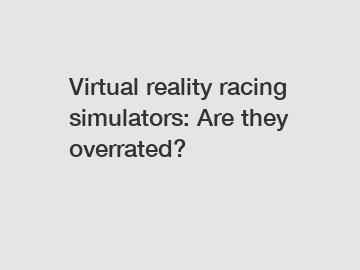Virtual reality racing simulators: Are they overrated?
Virtual reality (VR) racing simulators have become increasingly popular in recent years, offering a unique and immersive experience for gamers and racing enthusiasts alike. But with their growing popularity, some may question whether these simulators are overrated. Are they truly worth the hype, or are they just another passing trend in the world of gaming? In this blog, we will explore the pros and cons of virtual reality racing simulators and determine whether they are truly overrated.
First and foremost, virtual reality racing simulators offer a level of realism and immersion that traditional racing games simply cannot match. With VR technology, players are transported into the driver's seat of a high-speed race car, complete with stunning graphics and realistic sound effects. The sensation of speed and the thrill of the race are heightened in VR, making for an unforgettable gaming experience.
Furthermore, virtual reality racing simulators allow players to customize their experience in ways that were previously unimaginable. From adjusting the difficulty level to choosing different tracks and cars, VR racing games offer a level of flexibility and control that appeals to gamers of all skill levels. This level of customization adds a new layer of complexity and excitement to the gameplay, keeping players engaged and entertained for hours on end.

Another major advantage of virtual reality racing simulators is the ability to improve real-world racing skills. By practicing in a virtual environment, players can hone their driving techniques and learn to navigate different tracks and obstacles with ease. This can be particularly beneficial for aspiring race car drivers or enthusiasts looking to improve their skills on the track. With VR racing simulators, players can gain valuable experience and knowledge that can be applied to real-world racing scenarios.
However, despite their many benefits, virtual reality racing simulators are not without their drawbacks. One of the biggest criticisms of VR technology is its cost. High-quality VR headsets and racing simulation equipment can be quite expensive, making it inaccessible to some gamers. Additionally, setting up a VR racing simulator requires a significant amount of space and technical know-how, which may be challenging for some users.
Another potential downside of virtual reality racing simulators is the risk of motion sickness. Some players may experience nausea or dizziness when using VR headsets, especially during fast-paced racing games. This can detract from the overall gaming experience and may prevent some users from fully enjoying the simulator.
In conclusion, virtual reality racing simulators offer a unique and immersive gaming experience that is unmatched by traditional racing games. With their stunning graphics, realistic sound effects, and customizable gameplay options, VR racing games provide hours of entertainment for players of all skill levels. Additionally, virtual reality simulators can help improve real-world racing skills and offer a level of realism that is unparalleled in the world of gaming.
While virtual reality racing simulators may not be for everyone due to their cost and potential for motion sickness, they are certainly not overrated. These simulators offer a level of immersion and excitement that cannot be replicated in traditional racing games, making them a valuable addition to any gamer's collection. Whether you are a seasoned racing enthusiast or a casual gamer looking for a new experience, virtual reality racing simulators are definitely worth trying out.
The company is the world’s best virtual reality roller coaster simulator, vr bike ride, VR Drifting Simulator supplier. We are your one-stop shop for all needs. Our staff are highly-specialized and will help you find the product you need.
216
0
0

Comments
All Comments (0)